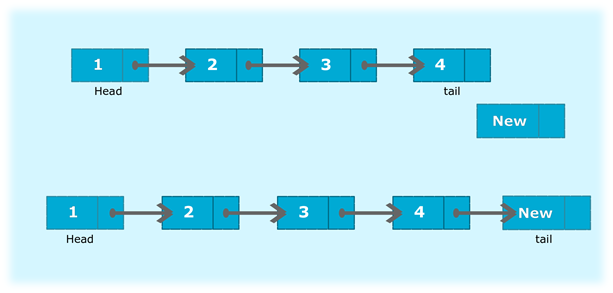Java在单链列表的末尾插入新节点
在此程序中,我们将创建单链列表,并在单链列表的末尾添加新节点名单。要完成此任务,请在列表尾部之后添加一个新节点,以使尾部的下一个指向新添加的节点。然后,将该新节点作为列表的新尾。

请考虑以上列表;节点4代表原始列表的尾部。让node New是需要在列表末尾添加的新节点。使4旁边指向新。将New设为列表的新尾。
算法
创建一个具有两个属性的类Node: data和next。下一个是指向列表中下一个节点的指针。
创建另一个具有两个属性的头类InsertEnd: head和tail。
addAtEnd()将在列表的末尾添加一个新节点:
创建一个新节点。
首先检查head是否等于null,这意味着列表为空。
如果列表为空,头和尾都将指向新添加的节点。
如果列表不为空,则新节点将被添加到列表的末尾,以使尾部的下一个指向新添加的节点。这个新节点将成为列表的新尾巴。
a.display()将显示列表中存在的节点:
定义一个当前将首先指向列表开头的节点。
遍历列表,直到当前指向null为止。
在每次迭代中通过使电流指向其旁边的节点来显示每个节点。
程序:
public class InsertEnd {
//Represent a node of the singly linked list
class Node{
int data;
Node next;
public Node(int data) {
this.data = data;
this.next = null;
}
}
//Represent the head and tail of the singly linked list
public Node head = null;
public Node tail = null;
//addAtEnd() will add a new node to the end of the list
public void addAtEnd(int data) {
//Create a new node
Node newNode = new Node(data);
//Checks if the list is empty
if(head == null) {
//if list is empty, both head and tail will point to new node
head = newNode;
tail = newNode;
}
else {
//newNode will be added after tail such that tails next will point to newNode
tail.next = newNode;
//newNode will become new tail of the list
tail = newNode;
}
}
//display() will display all the nodes present in the list
public void display() {
//Node current will point to head
Node current = head;
if(head == null) {
System.out.println("List is empty");
return;
}
System.out.println("Adding nodes to the end of the list: ");
while(current != null) {
//Prints each node by incrementing pointer
System.out.print(current.data + " ");
current = current.next;
}
System.out.println();
}
public static void main(String[] args) {
InsertEnd sList = new InsertEnd();
//Adding 1 to the list
sList.addAtEnd(1);
sList.display();
//Adding 2 to the list
sList.addAtEnd(2);
sList.display();
//Adding 3 to the list
sList.addAtEnd(3);
sList.display();
//Adding 4 to the list
sList.addAtEnd(4);
sList.display();
}
}
输出:
Adding nodes to the end of the list:
1
Adding nodes to the end of the list:
1 2
Adding nodes to the end of the list:
1 2 3
Adding nodes to the end of the list:
1 2 3 4

